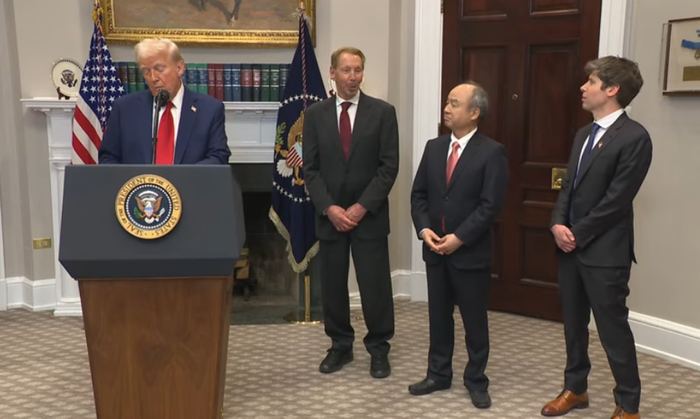
Within hours of taking the oath of office Monday, President Donald Trump took the first steps to reverse dozens of executive orders he called “harmful executive orders and actions,” including one enacted in 2023 about the safe and secure use of artificial intelligence.
Executive Order 14110, enacted in 2023 for the “Safe, Secure, and Trustworthy Development and Use of Artificial Intelligence,” was one of dozens on the Trump Administration's Executive Order “Initial Rescissions of Harmful Executive Orders and Actions.”
As of Tuesday morning, it no longer appeared on the White House website, nor does the fact sheet about the executive order.
Executive Order 14110 established a government-wide effort to guide responsible AI development, deployment and regulation.
It followed a voluntary White House agreement reached with technology companies leading the charge in AI development in July 2023, on a series of practices to ensure the safe deployment of AI. Executives from OpenAI, Google, Microsoft, Meta, Amazon, Anthropic and Inflection AI met with President Biden and committed to responsible AI practices.
With a new administration, Trump looks to be making some changes.
Bradley Shimmin, Omdia’s chief analyst, AI and data analytics said the move set an early tone for Trump’s term, emphasizing U.S.-led AI innovation without federal-level constraints. He said this could be a positive development.
“In some ways, this promises to be very good for the U.S. AI business ecosystem, as it makes it more difficult for special interests and larger AI players to quash smaller competitors through regulatory capture,” Shimmin said. “And from that vantage point, this move appears much more in line with current market demand for access to open and transparent AI solutions.
“Of course, we're only one day into a new U.S. administration, so there's a possibility the original executive order might be replaced. Moreover, this early move will not interrupt both state-level initiatives, nor will it free U.S. businesses from complying with regional mandates such as the EU AI Act. If anything, this move will only drive further debate and discussion among business and governmental leaders as to the best way to balance nation-led innovation without sacrificing individual protections.”
Regulations and standards are catalysts for innovation, creating a level playing field for all market participants and fostering fair competition between established players and new entrants, not impediments, Natalia Modjeska, Omdia research director of artificial intelligence, told AI Business in response to Trump’s decision.
“These guardrails also bolster consumer confidence in AI solutions and trust that these solutions deliver promised benefits without hidden risks or harms,” she said. “For businesses, regulatory compliance provides crucial legal clarity and risk mitigation. Eliminating these safeguards introduces uncertainty and shifts the burden of developing risk mitigation frameworks onto individual companies, increasing costs and liability.
“Paradoxically, the absence of clear standards and regulations may decelerate AI adoption, contrary to what the new administration hopes for, as consumers and enterprises become wary of risks and costs of unregulated technologies.
“Well-crafted regulations don't stifle progress; they provide a foundation for responsible innovation where technological advancements are aligned with societal values and business needs. Rather than removing these guardrails, building and refining them fosters a more robust, trustworthy AI ecosystem that benefits all stakeholders.”
Shawn Helms, co-head of the technology transactions and outsourcing practice and founding member of the AI group at McDermott Will and Emery, said the revocation was not surprising and marks a significant shift in the government’s approach to artificial intelligence regulation.
“The original EO, signed by President Biden, aimed to mitigate risks associated with AI by requiring developers to share safety test results with the government and directing agencies to establish standards for safety testing,” Helms said.
“By rescinding this EO, the Trump administration signals a preference for reducing regulatory oversight in favor of accelerating AI innovation. This move could potentially benefit major technology companies by lessening compliance burdens.
Like Modjeska, he noted concerns with removing federal safety and security standards, pointing out that their absence raises worries about the unchecked development and deployment of AI technologies.
“Without these guidelines, there is an increased risk of AI systems being released without adequate safeguards, potentially leading to issues such as algorithmic bias, privacy infringements and threats to national security,” Helms said.
“Looking ahead, the administration's approach suggests a focus on fostering rapid AI advancement to maintain a competitive edge globally, particularly against nations like China. It is worth noting that Elon Musk has historically advocated for more regulation on AI, viewing it as a necessary step to mitigate potential risks associated with the technology. Therefore, it is expected that the Trump administration will revisit AI regulation in a material way.”
This article first appeared in IoT World Today's sister publication AI Business.
About the Author
You May Also Like
.png?width=100&auto=webp&quality=80&disable=upscale)
.png?width=400&auto=webp&quality=80&disable=upscale)






